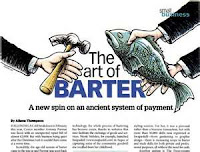In today’s economy, small business owners sometimes look to the oldest form of commerce – the exchange of goods and services, or bartering. The fair market value of property or services received through barter is taxable income.
Bartering is the trading of one product or service for another. Usually there is no exchange of cash. However, the fair market value of the goods and services exchanged must be reported as income by both parties.
Here are four facts about bartering that small business owners should be aware of:
1. Barter Exchange A barter exchange functions primarily as the organizer of a marketplace where members buy and sell products and services among themselves. Whether this activity operates out of a physical office or is internet based, a barter exchange is generally required to issue Form 1099-B, Proceeds from Broker and Barter Exchange Transactions, annually to their clients or members and to the IRS.
2. Barter Income Barter dollars or trade dollars are identical to real dollars for tax reporting. If you conduct any direct barter - barter for another’s products or services - you will have to report the fair market value of the products or services you received on your tax return.
3. Taxes Income from bartering is taxable in the year it is performed. Bartering may result in liabilities for income tax, self-employment tax, employment tax, or excise tax. Your barter activities may result in ordinary business income, capital gains or capital losses, or you may have a nondeductible personal loss.
4. Reporting The rules for reporting barter transactions may vary depending on which form of bartering takes place. Generally, you report this type of business income on Form 1040, Schedule C Profit or Loss from Business, or other business returns such as Form 1065 for Partnerships, Form 1120 for Corporations, or Form 1120-S for Small Business Corporations.
IRS CIRCULAR 230 Disclosure:
Under U.S. Treasury Department regulations, we are required to inform you that, unless expressly indicated, any tax advice contained in this post, or any attachment hereto, is not intended or written, to be used, and may not be used to (a)avoid penalties imposed under the Internal Revenue Code (or applicable state or local tax law provisions) or (b)promote, market, or recommend to another party any tax-related matters addressed herein.

No comments:
Post a Comment